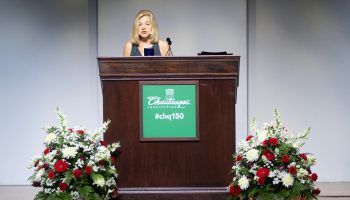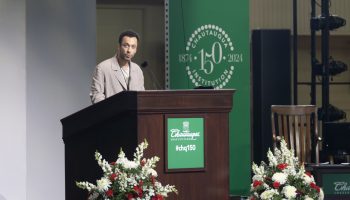NICK DANLAG – STAFF WRITER
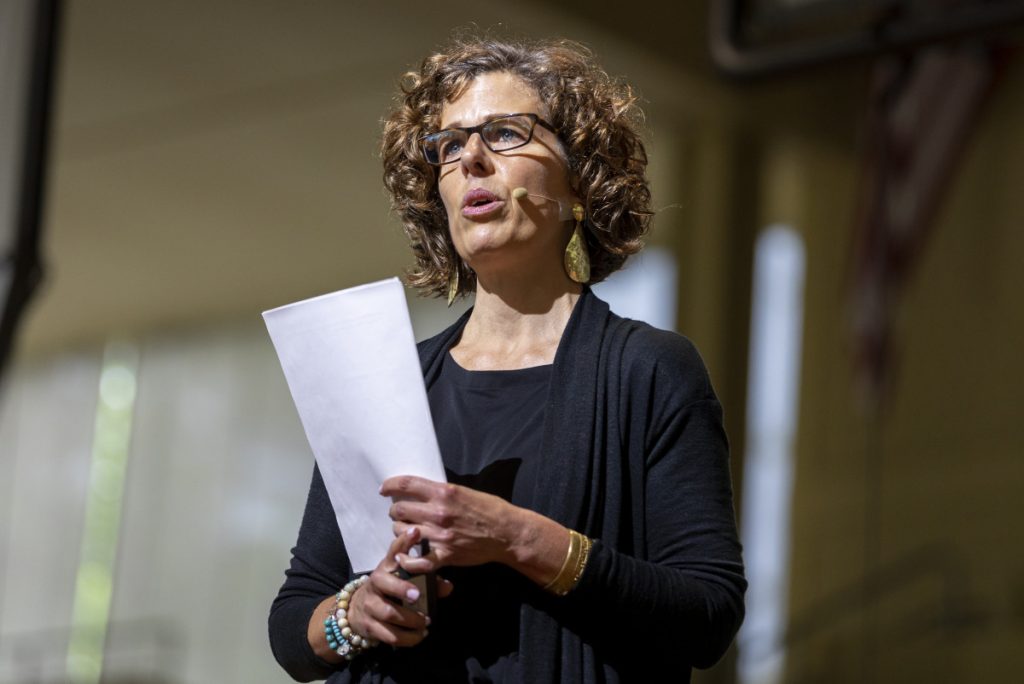
In one of her first listening sessions during her research on the views of rural Wisconsinites in 2008, Katherine Cramer drove 26 minutes from her Super 8 Motel to a gravel lot in a hamlet. She parked her Volkswagen Jetta among a row of pickup trucks and saw the local service station — where a member of the local county board told her a group of people gathered every morning to talk.
“It’s this beautiful, old, vintage service station,” said Cramer, professor of political science and the Natalie C. Holton Chair of Letters & Science at the University of Wisconsin-Madison, “these old gas pumps, no longer in operation, but big plate glass windows, kind of that lime green color, probably hadn’t been repainted since the ’60s, and I could hear the laughter.”
She walked in to see four men wearing big sweatshirts and baseball caps and sitting in plastic lawn chairs with plenty of Milwaukee Brewers memorabilia around. Cramer introduced herself, told them that she was a professor and asked if she could join them.
The men, retired public school teachers, chuckled and said, “Sure.” Cramer asked the men what the major concerns were for the people in the area. The men told her their worries: The state legislature had been taking the money allocated for the highway and spending it elsewhere; the state liquor tax was low and they were concerned about drunk driving in their area; the price of gas was too high, and so was the price of health care.
These concerns were similar to what she was hearing in small communities all across Wisconsin — a resentment toward those in cities, where all the decisions were being made without care of those in rural communities.
“(The government doesn’t) know what our lives are like,” Cramer said she heard. “They don’t understand the challenges that we’re facing. Maybe they pass through as tourists, but that’s not the same as knowing what it feels like to live, yes, in a beautiful tourist place, but having to work two or three jobs during tourist season to make ends meet.”
As well as being a professor, Cramer is the author of The Politics of Resentment: Rural Consciousness in Wisconsin and the Rise of Scott Walker. At 10:30 a.m. on Wednesday, July 21 in the Amphitheater, Cramer presented her lecture, “Listening to Disrupt,” as part of Week Four’s theme of “Many Americas: Navigating Our Divides.” Cramer, who spent time listening to groups of people across rural Wisconsin, noted the deep disconnect between demographics in cities and small towns. She stressed the importance of listening — not to convince, or even change one’s own mind, but to open oneself up to the possibility of what society can achieve together.
The divides Cramer saw appeared in both Democratic and Republican communities. Far, “way up there,” in the northwest corner of Wisconsin in Bayfield County, in a very left-leaning, touristy and artsy community, Cramer talked to a group of women retirees.
After the conversation, one woman showed her a notebook and said, “This is a list of all the families who had to move away from here because of property taxes.” The notebook had 60 families’ names.
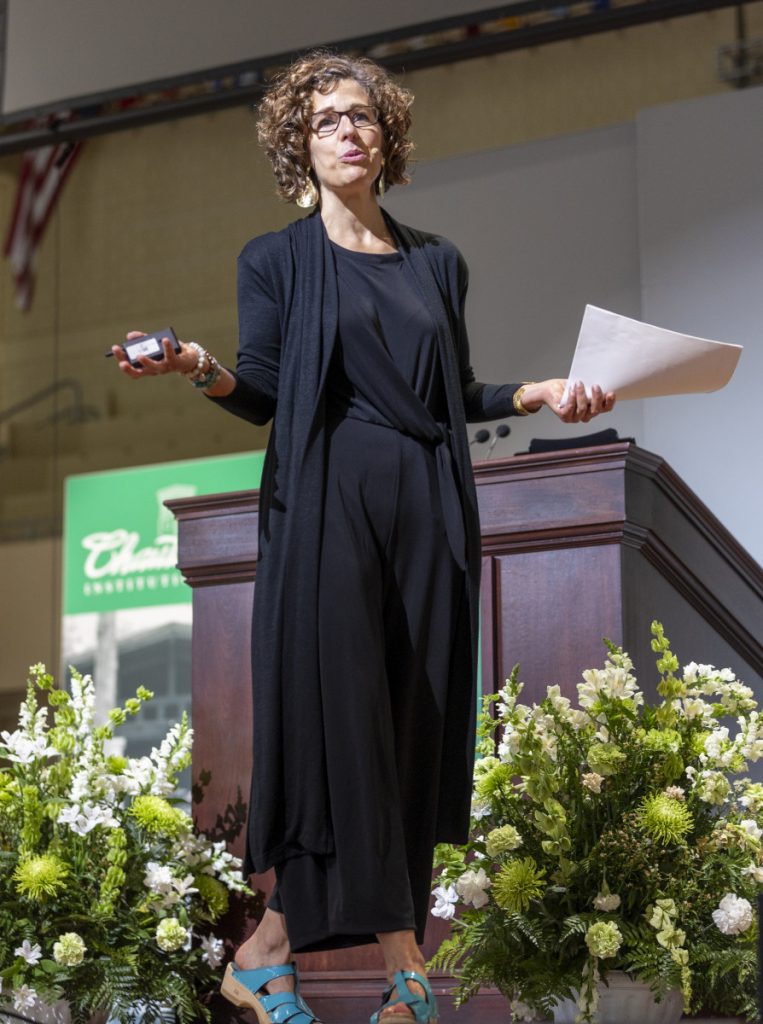
She explained to Cramer that because of people moving in and buying big vacation homes, property taxes were raised, and people who had lived in the community for generations were forced to leave because of prohibitive costs.
Property taxes and a lack of jobs were also problems faced by the group in the service station, and all of rural Wisconsin. One day in 2012, during one of Cramer’s many visits to the small town, none of the pickup trucks sat in the gravel lot and a note hung on the door. It was an apology from the owner, who had quit because he got a similar job with better pay.
The Bayfield women were tired, too. Cramer asked them how much attention the government paid to the people’s approval of their decisions.
There was a long pause. One said the government was starting to get it. Another, named Dorothy, disagreed.
“Dorothy says, ‘I think it’s in the beltway. Madison might listen to Madison people. Washington, D.C. is a country unto itself. I know it. I’ve lived there. They haven’t got a clue what the rest of the nation is up to. They’re so absorbed studying their own belly button,’ ” Cramer said.
This divide between urban and rural Wisconsin surprised Cramer. Her intent was to study how the differences between social class identity affects the way people view politics, but that wasn’t what she found. Instead, she found statewide resentment, some of which took the form of racism.
“The racism is important, but I’ve waited until now to bring it up, because it’s important in a scary way. … Notice how it’s woven into people’s understandings here, all of our understandings,” she said. “These notions of who works hard in our population are so important because they’re so bound up in our political culture with who is a ‘deserving’ American.”
Cramer said some people she talked to assumed that certain races were lazy. And, in 2016, she noticed the rhetoric in her discussion groups changing.
“I was kind of amazed at the rhetoric that I heard, because I had heard some blatant racism in the conversations before, but the tone was different,” Cramer said. “There was more of it, and a lot more conversation about immigrants.”
Before the 2016 presidential campaign, when Cramer asked about immigration, she would get little response. During the campaign and afterwards, she never even had to ask.
“I heard a lot about immigrants and immigration, and a lot of it wasn’t pretty,” Cramer said.
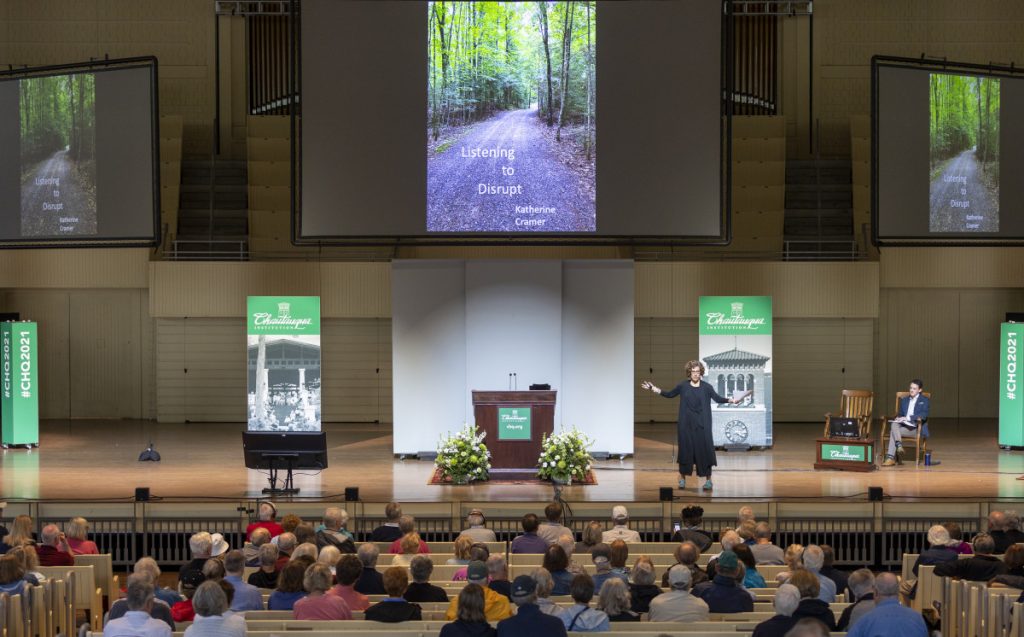
After President Donald Trump was elected — and won Wisconsin along the way — family, friends and strangers, shocked, reached out to Cramer asking her to explain why the rural parts of the state voted this way.
“Well, if you have been asking yourself that, and you’re this far into my talk, I encourage you to just take a pause,” Cramer said.
And then Cramer talked about the pandemic. Cramer’s pandemic project was spending time with her 13-year-old daughter and building trees. In the corner of her living room, Cramer created “a willow that glows” made of chicken wire, papier-mâché and spray paint, with green felt and holiday lights on the ceiling with green fabric draping down.
“Trees felt good. They were bigger than me. They were something to aspire to,” Cramer said. “They also communicate with one another, through these underground systems, so that trees warn each other of danger. They figure out how to share resources. They figure out how to devote resources to those most in need. There are trees that operate like mothers and make sure the saplings get what they need in order to thrive.”
Cramer also went into the forest to learn to identify trees, and noted the many different kinds of trees at Chautauqua.
“What a restorative thing to surround myself with, to immerse myself in,” Cramer said, “and not just because of all the things that we have been experiencing together on this planet, but because I had been studying resentment for 13 years prior to when the pandemic started.”
To help bridge gaps within society, she said people need to build in little gaps of reflection in their schedules, even if it is just a little bit.
“I think we need a deeper understanding of why that is the case, what it is that listening does for us. The reason we need more listening is not to become like one another,” Cramer said. “The reason we need more listening is that listening opens us up to what we can become together. It interrupts the process of ramming ahead, exactly like we have been doing: building lies, demonizing the Other.”
Cramer then returned to the forest metaphor.
“Trees and fungi might grow these connections naturally. Not in modern society — we have the capacity, it’s in our DNA. We have the capacity to love and to look out for one another — but we don’t do it,” Cramer said. “If anything, we are growing things that disrupt those connections. We are not making life-sustaining ways of communicating with one another. So we have to intentionally figure out how.”
As part of the Q-and-A session, Jordan Steves, director of strategic communications, asked Cramer how the pandemic changed her work.
Cramer said she listened to a lot of talk radio from different parts of Wisconsin. She noticed many people from small communities were angry with the COVID-19 guidelines, especially given that many of them lived miles away from their closest neighbors, as opposed to the closeness that people in cities lived in.
Steves then asked Cramer if the data supports the beliefs of the people she talked to.
She said in some ways it does, and some ways it doesn’t. For example, rural communities receive more money per person from state and federal taxpayer money.
“Probably, as you picked up from my remarks, and David French and Amanda Ripley too this week, that it’s not about facts. It’s about people’s perceptions and their perspectives,” Cramer said. “If you’re looking at the world through a lens of, ‘People like me, we don’t get what we deserve,’ facts that you encounter — you interpret through that lens.”



